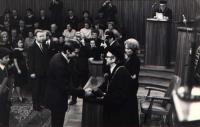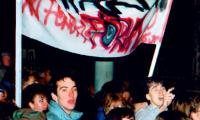I am not ashamed of my having joined the Communist Party. But I can be ashamed of the fact that I haven’t left the Party the moment I realized that there was no future in it

Download image
Milan Šmíd was born September 5, 1944. His father, an entrepreneur, was arrested on October 10, 1949 and he spent two years in a forced labour camp. Due to his father’s unfavourable personal profile, in 1958 Milan Šmíd was not admitted to a secondary school. He thus took a vocational training as a typesetter in the state-owned company Knihtisk. Following the father’s arrest, an atmosphere of fear prevailed in the family, followed by an effort at conformity. In 1965, after going through his military service, Milan Šmíd was admitted to the Faculty of Education and Journalism of Charles University, and at the same time he joined the Communist party. Shortly after the Soviet invasion in August 1968 he went to England where he found a job with the Associated Press, but he returned two weeks later because of his girlfriend who was not allowed to leave Czechoslovakia. In autumn 1969 he was offered permanent employment in the department of foreign news in the Czechoslovak Television, and a year later he passed the Party’s check - even though, as he emphasizes, he has never explicitly expressed an agreement with the entry of the Warsaw Pact armies. In 1973 he stopped appearing on the screen, but he continued working in the television till the revolution in November 1989. During the days of the Velvet Revolution his son Michal got beaten and his identity card was torn up, and a rumour spread about his older son Martin, claiming that he had been killed in the demonstration. In March 1990 Milan Šmíd left the Communist Party. Since 1990 he has been teaching at the Faculty of Social Sciences of Charles University. He is a respected expert on digital media.


